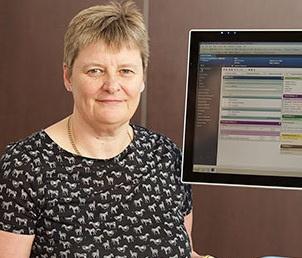






#MyHealthMyData
In March 2021, the Commission launched 'Europe's Digital Decade', sharing a 'Digital Compass' to improve digital skills, infrastructure, business, & public services.
The 'Public Services' point on the compass includes a commitment to give all citizens full access to their medical records by 2030.
In January 2022, the Commission proposed a Declaration on digital rights and principles for a humancentred digital transformation.
The implementation of the national maternity EHR (MN-CMS) started in 2016, and four of the 19 maternity hospitals 'went digital' in phase 1.
#MyHealthMyData
The MN-CMS currently does not have a portal for mothers to view their information during pregnancy or their babies information after birth.
81% of 201 women providing feedback on the MN-CMS* want access to their charts online & 91% (of 81%) want access to their full chart.
A clinician's perspective:
Listen to the podcast episode at https://bit.ly/3FGbBO1

"There is nobody more interested in the patient’s health, than the patient themselves, and I would not have any reticence at all about patients having access to their own records, I would say bring it on!”
DR GRAINNE COURTNEY
Former Chief Clinical Information Officer at St James’ Hospital, Dublin
MY NAME IS CiaraO'Meara
I LIVE WITH MultipleSclerosis

IN THE PAST, I OBTAINED ACCESS TO MY HEALTH INFORMATION BY requestingitundertheFreedom of Information Act - completing numerous forms for EACH hospital(evenifthosehospitalswereunderthesamebranch),at EACHappointment,forEACHtest!
IN THE FUTURE, I WANT ACCESS TO MY HEALTH INFORMATION VIA anonline,easy-to-useplatform where ALL my medical records (regardless of the hospital or consultant) are together, in the one place,accessible day or night–nowwouldn’tthatjustbethedream!
MY NAME IS Kerry Lawless

I LIVE WITH Chronic lyme disease & breast cancer IN THE PAST, I OBTAINED ACCESS TO MY HEALTH INFORMATION BY Standing in the doctor's surgery and waiting for the printer - EACH time, for EACH test - and then going home and filing the paper in my own notes!
IN THE FUTURE, I WANT ACCESS TO MY HEALTH INFORMATION VIA
An online portal, which is updated in real-time, and contains the details of my full medical history!
HEALTH INFORMATION IS PATIENT INFORMATION

MY NAME IS Mark Byrne

I LIVE WITH Stage 4 Male Breast Cancer
IN THE PAST, I OBTAINED ACCESS TO MY HEALTH INFORMATION BY Ringing my Oncologist, and by following up on scans and appointments with my GP
IN THE FUTURE, I WANT ACCESS TO MY HEALTH INFORMATION VIA A secure patient database where I can access my own personal information from anywhere in the European Union.
HEALTH INFORMATION IS PATIENT INFORMATION

The creation of a legal basis for a patient summary care record - a 'mini' health record for use in emergency or overseas care
The creation of a legal basis for the linking of the PPSN with health information contained in public and private health settings, and with the individual health identifier (IHI).
The establishment of a number of improvements in the rights of individuals to access and to carry their health information with them.
NATIONAL GUARDIAN A NATIONAL CENTRE
The establishment of the role of a national guardian to champion the rights of individuals in relation to their data (similar to the model in the UK).
The creation of a centre to process data for the summary care record and for specified purposes relating to service planning, public policy, health registries, research and innovation.

The EU General Data Protection Regulation (GDPR) (2018) and the Irish Data Protection Act (2018) provide the legal basis for individuals to access their own health information (for example, their medical record)

GDPR details different types of personal data, as well as ‘special categories of personal data’ which include things like health data, genetic data, biometric data.
Individuals have the right to request any personal data which is being ‘processed’ (used in any way) by data ‘controllers’ (those who decide how and why data is processed).
GDPR states that you need to make a data access request, but it does not set out any particular method for making a valid access request. Requests can be made in writing or verbally.
GDPR does set a timeframe of one month to respond to a valid request, and it underlines that requests should be processed without undue delay.
The HSE Frequently Asked Questions on GDPR detail a number of rights which individuals have in relation to their data:
A right to get access to your personal information
A right to request us to correct inaccurate information, or update incomplete information
A right to request that we restrict the processing of your information in certain circumstances
A right to request the deletion of personal information excluding medical records
A right to receive the electronic personal information you provided to us in a portable electronic format
A right to object to us processing your personal information in certain circumstances
A right to lodge a complaint with the data protection commissioner
To access data held by the HSE, it is suggested that you complete a Subject Access Request Form There are seven steps involved in the access process
You also have the option to apply under the Freedom of Information Act 2014 as the HSE are on the list of FOI bodies The HSE shares how to do this, and provides a form for requests.
To access data held by private or voluntary hospitals, private nursing homes, or GPs you will need to apply directly to them (not to the HSE) and follow the process outlined).
THE IRISH DATA PROTECTION COMMISSIONER HAS PREPARED A FULL GUIDANCE NOTE ON DATA SUBJECT ACCESS REQUESTS
STILL NOT SURE? ....simply send an email
Dear Sir/Madam, I wish to make an access request under Article 15 of the General Data Protection Regulation (GDPR) for a copy of any information you keep about me, on computer or in manual form in relation to...
#MyHealthMyData
2004
In 2004, the Dept of Children & Health published ‘Health Information: A National Strategy’ outlining Ireland's policy approach
2014
The Health Identifiers Act authorized the allocation of a unique Individual Health Identifier (IHI) to each individual accessing health services in Ireland
2013
The eHealth Strategy for Ireland set out plans for how to introduce ehealth It created a new authority, eHealth Ireland, within the HSE to advance key projects
2016
A business case for a national electronic health record (EHR), requesting €875m to move from paper to digital, was rejected by the Dept of Public Expenditure and Reform
2016
The National Maternal and Newborn Electronic Health Record was piloted (and later rolled out to all maternity units) There is currently no portal for mothers to view their information during or after pregnancy
2021
An Individual Health Identifier is allocated to many citizens in Ireland as part of the COVID vaccination roll-out
2017
Slaintecare report called out ehealth as central to a modern health service
2018
The EU General Data Protection Regulation entered into force across Europe Article 15 gave EU citizens the right to request their own health information.
2022 (april)
The Minister announces plans to draft a Health Information Bill
In 2024/25, the National Children's Hospital will open with an Electronic Health Record and Portal where patients can view their health information.
YOU MAY WANT TO TAKE CONTROL OVER YOUR OWN HEALTH AND MONITOR VITAL SIGNS AND INDICATORS
YOU MAY WISH TO RECALL WHAT A DOCTOR HAS SAID TO YOU ABOUT YOUR HEALTH OR TREATMENT PLAN
YOU MAY WANT TO SHARE YOUR INFORMATION WITH A CARER OR FAMILY MEMBER
YOU MAY WANT TO CHECK THE DOSE OR FREQUENCY OF A MEDICINE, OR YOUR VACCINE STATUS
YOU MAY WANT TO REVIEW BLOOD RESULTS, SCANS OR X-RAY REPORTS
YOU MAY WANT TO SCHEDULE CHECK UPS AND TESTS AND REMEMBER KEY DATES
YOU MAY WANT TO PREPARE A LIST OF QUESTIONS FOR YOUR NEXT APPOINTMENT
YOU MAY WANT TO TRAVEL ABROAD AND CARRY YOUR HEALTH INFORMATION WITH YOU
We need a place to store all the health information that the health service generates about an individual over a lifetime The EHR is a digital medical record The National Children's Hospital will be the first hospital with an EHR (planned for late 2024)
We need to provide individuals with access to their own health information - in full and in summary - via a single point of access such as a portal The portal content and function should be co-designed with the individuals who use it.
01 02 03 04 05
We need to link up the different pieces of health information about an individual The IHI gives each health service user a unique number which is attached to each piece of their health information
We need to make a summary of the health information contained in the EHR available to support healthcare professionals who are providing individuals with emergency care or overseas care and who only need the most relevant pieces of health information about an individual
We need to progress a suite of smaller health infrastructure projects to pilot approaches and to make incremental steps towards a larger vision for the digitalisation of health The national maternity record and e-prescribing are two examples